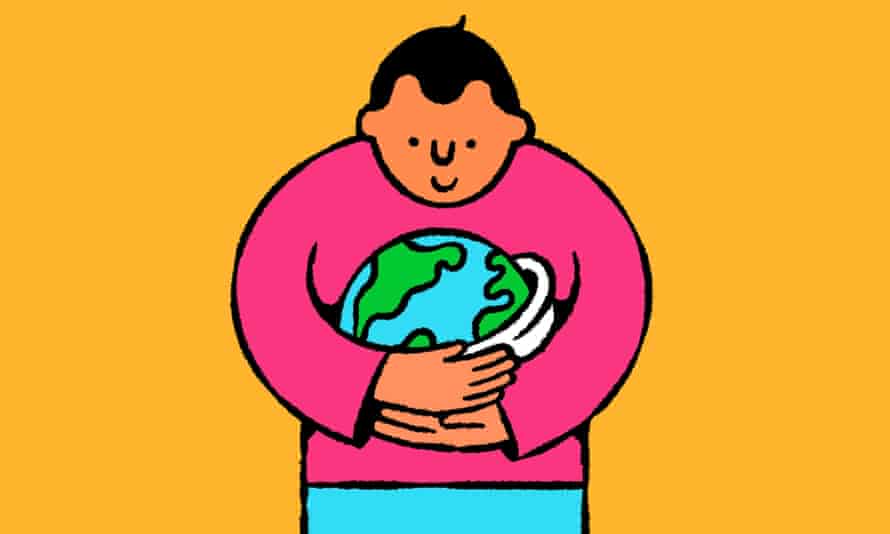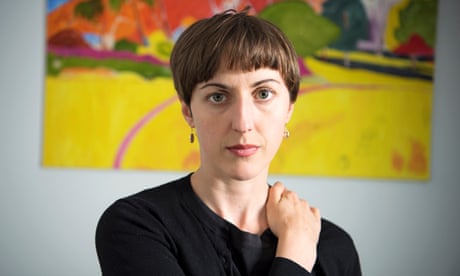POSTMODERN EUGENICS
‘More people is the last thing this planet needs’: the men getting vasectomies to save the world
Illustration: Till Lauer/The Guardian
With the climate crisis becoming ever more urgent, a growing number of young, childless men are t Making the drastic decision of being sterilised for environmental reasons
Simon Usborne
With the climate crisis becoming ever more urgent, a growing number of young, childless men are
Simon Usborne
The Guardian
Wed 12 Jan 2022
When Lloyd Williamson lay on his back in a GP’s clinic late last November, it was for the surgical culmination of years of soul searching. Williamson, who is 30 and from Essex, remembers wanting a family as a child, but something changed in his early 20s. “I thought: you know what? I don’t want to bring a life into this world, because it’s pretty shitty as it is and it’s only going to get worse,” he says, two weeks after his vasectomy.
Williamson was largely motivated to sterilise himself by the climate crisis. Given the link between fossil-fuelled economic growth and population growth, he believes that having fewer children is one thing individuals can do to help. “We can’t offset our carbon problem on to the next generation, because it’s not fair on them,” he says.
Williamson, who works as a data support officer for Essex county council (he stood unsuccessfully as a Green party councillor in Chelmsford in 2019), says he knows of other young, childless men who are thinking of doing the same thing. While reliable data on vasectomy numbers and motivations is scant, there is growing evidence to suggest that, all over the world, men without children are taking direct action.
Nick Demediuk, an Australian GP and one of the world’s most prolific vasectomy clinicians, says most of his patients are fathers over the age of 35. But the doctor, who has completed more than 40,000 procedures since 1981, now estimates that about 200 of the 4,000 patients his clinic sees each year are younger men without kids. About 130 of them say they are doing it for the planet.
Wed 12 Jan 2022
When Lloyd Williamson lay on his back in a GP’s clinic late last November, it was for the surgical culmination of years of soul searching. Williamson, who is 30 and from Essex, remembers wanting a family as a child, but something changed in his early 20s. “I thought: you know what? I don’t want to bring a life into this world, because it’s pretty shitty as it is and it’s only going to get worse,” he says, two weeks after his vasectomy.
Williamson was largely motivated to sterilise himself by the climate crisis. Given the link between fossil-fuelled economic growth and population growth, he believes that having fewer children is one thing individuals can do to help. “We can’t offset our carbon problem on to the next generation, because it’s not fair on them,” he says.
Williamson, who works as a data support officer for Essex county council (he stood unsuccessfully as a Green party councillor in Chelmsford in 2019), says he knows of other young, childless men who are thinking of doing the same thing. While reliable data on vasectomy numbers and motivations is scant, there is growing evidence to suggest that, all over the world, men without children are taking direct action.
Nick Demediuk, an Australian GP and one of the world’s most prolific vasectomy clinicians, says most of his patients are fathers over the age of 35. But the doctor, who has completed more than 40,000 procedures since 1981, now estimates that about 200 of the 4,000 patients his clinic sees each year are younger men without kids. About 130 of them say they are doing it for the planet.
We can’t offset our carbon problem on to the next generation, because it’s not fair on them
Lloyd Williamson
“In the old days, it was purely lifestyle,” Demediuk says of his younger, childless patients. “They wanted to travel the world, work hard and not be stuck with a kid. And that has shifted, probably over the past three or four years, to where the environment is the dominant reason.”
It should not be surprising that a generation with increased awareness of the climate emergency is asking big questions about traditional family structures. In 2019, the then 29-year-old US congresswoman Alexandria Ocasio-Cortez held back tears as she gave a speech about the climate emergency. “I speak to you as a human being, a woman whose dreams of motherhood now taste bittersweet because of what I know about our children’s future,” she told a summit of mayors in Copenhagen. “Our actions are responsible for bringing their most dire possibilities into focus.
A study in 2017 said the single most effective action an individual could take in terms of helping the planet was having one fewer child; this would save more than 25 times the emissions of the next biggest undertakings (living without a car and avoiding long-haul flights). Prince Harry cited the climate when he revealed in a 2019 interview with Vogue that he would not be having more than two children.
Matthew Schneider-Mayerson, an associate professor of environmental studies at Yale-NUS College in Singapore, is the author of a forthcoming book about “eco-reproductive” choice. Last year, he carried out a detailed survey of 600 people aged 27 to 45 who were worried about the climate crisis. Of these, 96% worried that their children would struggle to thrive in or even survive the worst-case climate scenarios, while 60% were concerned about the carbon footprint of their potential offspring.
Schneider-Mayerson has not explored the rise of the climate vasectomy. It may still be a niche choice, often informed by other factors, including a broader ambivalence about raising children. But it raises ethical and political questions, including about controversial “overpopulation” ideologies, as well as the practical consequences of generationally imbalanced societies. Apart from anything, Schneider-Mayerson says, “it’s sad that people are being forced to factor climate change into this decision”.
For Nate Miller (not his real name), a 36-year-old from Colorado, the election in 2016 of Donald Trump, a climate science denier, was the clincher. “I made an appointment to get a vasectomy later that week,” he says. Like Williamson, Miller, who works for an environmental charity, had grown up balancing an assumption that he would have kids with a deepening environmental conscience. “We’re driving ecosystems out of balance and causing mass extinction of countless species,” he says. “I think more people is the very last thing this planet needs.”
Other forms of contraception had worked for Miller and his long-term partner, but getting a vasectomy felt like a definitive act. They found a urologist, who booked in Miller after checking he was certain of his decision. Miller also wanted to be reassured, given the widely held view that the procedure is bloody, painful and somehow emasculating.
This perception is outdated, Demediuk says. The operation, which used to be more invasive and was carried out under general anaesthetic, is now typically bloodless; there is no scalpel involved. Instead, the scrotum is punctured under local anaesthetic with a tiny pair of forceps, creating a hole just big enough for the vasa deferentia – the two sperm-carrying tubes – to be drawn into the open air. The tubes are cut, sealed and popped back in. Demediuk says the hole rarely requires a dressing, much less a stitch. The process takes 15 minutes and is more than 99% effective. Miller and Williamson say they were back to normal in days.

Illustration: Till Lauer/The Guardian
Vasectomies address the gender imbalance that still accompanies the choice and practice of birth control. They come with less risk than more invasive and less reliable methods of female contraception, including sterilisation and the coil. Yet they can be hard to come by, especially for younger, childless men.
Williamson had thought about getting a vasectomy in his early 20s, but was put off by grisly stories he heard from older men who had had the procedure years ago. Williamson waited in vain for the still-elusive “male pill” until, at 25, he learned about advances in the vasectomy. He asked his GP if he could have one and was rebuffed.
Vasectomies address the gender imbalance that still accompanies the choice and practice of birth control. They come with less risk than more invasive and less reliable methods of female contraception, including sterilisation and the coil. Yet they can be hard to come by, especially for younger, childless men.
Williamson had thought about getting a vasectomy in his early 20s, but was put off by grisly stories he heard from older men who had had the procedure years ago. Williamson waited in vain for the still-elusive “male pill” until, at 25, he learned about advances in the vasectomy. He asked his GP if he could have one and was rebuffed.
While there are no laws on the age at which men in the UK can get a vasectomy, the NHS advises that they may be more likely to be accepted if they are older than 30 and have children. “Your GP can refuse to carry out the procedure … if they don’t believe it’s in your best interests,” says the guidance, which also warns that reversals are unreliable, with a success rate of 55% within 10 years and only 25% thereafter.
Williamson accepts that minds and circumstances can change, but he viewed the guidance as paternalistic. When he turned 30, he tried again. This time, his GP agreed, but said he would have to pay; the Mid Essex clinical commissioning group (CCG) – the GP-led body responsible for buying healthcare services in his area – withdrew funding for vasectomies in 2016 to save money. In an email, it says demand was low; it adds that vasectomies “can be accessed relatively easily without too much financial burden and there are freely available contraceptive methods for women”.
Mid Essex was one of nine CCGs that cut or considered cutting funding around the same time, drawing heavy criticism from family-planning charities. When I contact NHS England to establish how widely the procedure has been withdrawn, it says I will need to speak separately to all of England’s 106 CCGs. Access and waiting lists also vary in Scotland, Wales and Northern Ireland. Reversals are rarely covered by the NHS and cost thousands of pounds.
It’s about gender equity, family planning
and more responsible masculinityJonathan Stack
Williamson’s GP referred him to David Acorn, a GP in Essex who runs a private vasectomy clinic, one of dozens across the UK. Acorn, who charges £360 for the procedure, says Williamson was the first patient he saw who explicitly cited the climate as a reason. But he says he is getting more inquiries from younger, childless men. “I’m particularly keen to make sure they fully understand the potential permanence of what they’re asking for,” he says.
Funding cuts may be part of the reason for an apparent decline in vasectomy numbers, but the privatisation of the procedure makes demand hard to track. According to NHS figures, there were almost 20,000 operations in 2010/11 and fewer than 4,500 in 2020/21. Whatever the true figure, family-planning groups are trying to rebrand “the snip” to tempt more men to share the burden of contraception.
There is hope that the climate crisis may burnish the vasectomy’s progressive image. In 2012, Jonathan Stack, a 64-year-old American film-maker, co-founded World Vasectomy Day, a campaign dedicated to tackling the stigma and myths surrounding the modern vasectomy. Stack had one himself after having three children. “It’s about gender equity, family planning and more responsible masculinity,” he tells me from his home in New York.
World Vasectomy Day is now an annual event and year-round programme that has worked with family-planning groups and public health bodies around the world. Clinicians, who are offered training in the latest no-scalpel technique, have performed almost 100,000 vasectomies as part of the campaign.
Four or five years ago, Stack began to notice growing demand among younger, childless men. “A lot of it has to do with a feeling of economic instability and a general sense of uncertainty in life,” he says. Nonetheless, when we speak, he is surprised by an unpublished campaign report he has just received from a project in Bolivia run jointly by World Vasectomy Day, Marie Stopes Bolivia and Université Laval in Canada.

Family-planning groups are trying to rebrand ‘the snip’ to tempt more men to share the burden of contraception.
Photograph: Thomas Barwick/Getty Images
In November, four Bolivian physicians received training, part of which involved performing 127 supervised vasectomies. The average age of the patients was 31 and 25% did not have children. When all the men were asked why they were getting a vasectomy, 48% said they didn’t want more kids. What stood out for Stack, though, was that 28% of the men said they were motivated by climate concerns.
“Seeing this growing trend of people who don’t have enough faith in the future to believe having a child is a good decision is a little disturbing,” he says. Yet he adds: “What do we read in the news that would make us think this is a great time for kids?”
Stack is not alone in having a sense of unease about the push to curb procreation. Demographers have already predicted that the global population will enter a sustained decline by the end of this century, easing demand for resources but fuelling far-reaching shifts in society. A care crisis among older people is already playing out in many parts of the world. In May, China announced it will allow couples to have three children, after the shift of its notorious one‑child policy to two children in 2016 failed to increase the plummeting birthrate.

BirthStrikers: meet the women who refuse to have children until climate change ends
Stack is anxious to distance his campaign from theories of “overpopulation” and their longstanding overlaps with anti-immigration and often racist ideologies such as eugenics and eco-fascism. Paul Ehrlich’s landmark 1968 book The Population Bomb is credited with amplifying the environmental movement, but “populationism” has also been widely blamed for emboldening rightwing population-control and immigration policies.
In 2018, the British songwriter and activist Blythe Pepino co-founded the BirthStrike movement, for people who had decided to forgo children in response to the coming “climate breakdown and civilisation collapse”. The well-meaning group made a splash, but shut its website in 2020 because the name BirthStrike “did no end of harm in allowing us to be aligned with the ‘overpopulation’ topic”.
Another controversial moral philosophy, antinatalism, calls for the extinction of the human race by ending procreation. “I think there would be some concern if the climate movement becomes closely attached to antinatalism or an ethic that calculates the value of human life and carbon emissions,” says Schneider-Mayerson.
In November, four Bolivian physicians received training, part of which involved performing 127 supervised vasectomies. The average age of the patients was 31 and 25% did not have children. When all the men were asked why they were getting a vasectomy, 48% said they didn’t want more kids. What stood out for Stack, though, was that 28% of the men said they were motivated by climate concerns.
“Seeing this growing trend of people who don’t have enough faith in the future to believe having a child is a good decision is a little disturbing,” he says. Yet he adds: “What do we read in the news that would make us think this is a great time for kids?”
Stack is not alone in having a sense of unease about the push to curb procreation. Demographers have already predicted that the global population will enter a sustained decline by the end of this century, easing demand for resources but fuelling far-reaching shifts in society. A care crisis among older people is already playing out in many parts of the world. In May, China announced it will allow couples to have three children, after the shift of its notorious one‑child policy to two children in 2016 failed to increase the plummeting birthrate.

BirthStrikers: meet the women who refuse to have children until climate change ends
Stack is anxious to distance his campaign from theories of “overpopulation” and their longstanding overlaps with anti-immigration and often racist ideologies such as eugenics and eco-fascism. Paul Ehrlich’s landmark 1968 book The Population Bomb is credited with amplifying the environmental movement, but “populationism” has also been widely blamed for emboldening rightwing population-control and immigration policies.
In 2018, the British songwriter and activist Blythe Pepino co-founded the BirthStrike movement, for people who had decided to forgo children in response to the coming “climate breakdown and civilisation collapse”. The well-meaning group made a splash, but shut its website in 2020 because the name BirthStrike “did no end of harm in allowing us to be aligned with the ‘overpopulation’ topic”.
Another controversial moral philosophy, antinatalism, calls for the extinction of the human race by ending procreation. “I think there would be some concern if the climate movement becomes closely attached to antinatalism or an ethic that calculates the value of human life and carbon emissions,” says Schneider-Mayerson.
ADOPTION THE REAL OPTION
Vasectomies don’t necessarily preclude parenting. Rodney Pohl, 26, an IT technician, is planning to foster or adopt with his wife, Carrie, who watched Pohl’s vasectomy at the SimpleVas clinic near their home in Cedar Rapids, Iowa, last June. The couple were motivated partly by weather extremes and what they foretold. A recent polar vortex had taken out the power on their street for 10 days. “We had neighbours breastfeeding small infants and we were sharing generators to try to keep their fridge going, to not waste [expressed] milk,” Pohl says.
In Essex, Williamson, who is not in a long-term relationship, says he may also adopt one day. “There are more than enough children and young adults already out there who could have a loving home and family – it doesn’t have to be your own blood,” he says. Neither he nor Miller expect to regret their vasectomies. Pohl says he very occasionally feels pangs of broodiness. “But I quickly move on,” he says.
Williamson says he cried after his procedure, but with relief. “It was such a weight off my mind after having all that uncertainty about bringing someone into this world,” he says. He says he wishes that governments were doing more to legislate for the climate crisis, before sharing his thoughts about what is known as “bystander apathy”. “A lot of people are happy to point and say: ‘That’s wrong,’ or film it on their phone,” he says. “I look at the world and say: ‘That’s not right; I’m going to try to do something about it.’”
Vasectomies don’t necessarily preclude parenting. Rodney Pohl, 26, an IT technician, is planning to foster or adopt with his wife, Carrie, who watched Pohl’s vasectomy at the SimpleVas clinic near their home in Cedar Rapids, Iowa, last June. The couple were motivated partly by weather extremes and what they foretold. A recent polar vortex had taken out the power on their street for 10 days. “We had neighbours breastfeeding small infants and we were sharing generators to try to keep their fridge going, to not waste [expressed] milk,” Pohl says.
In Essex, Williamson, who is not in a long-term relationship, says he may also adopt one day. “There are more than enough children and young adults already out there who could have a loving home and family – it doesn’t have to be your own blood,” he says. Neither he nor Miller expect to regret their vasectomies. Pohl says he very occasionally feels pangs of broodiness. “But I quickly move on,” he says.
Williamson says he cried after his procedure, but with relief. “It was such a weight off my mind after having all that uncertainty about bringing someone into this world,” he says. He says he wishes that governments were doing more to legislate for the climate crisis, before sharing his thoughts about what is known as “bystander apathy”. “A lot of people are happy to point and say: ‘That’s wrong,’ or film it on their phone,” he says. “I look at the world and say: ‘That’s not right; I’m going to try to do something about it.’”
No comments:
Post a Comment